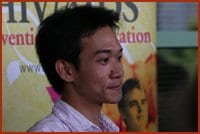Imagine having to walk into a pool hall full of strangers and hand out condoms with attached pamphlets to strangers.
This is part of Corey Wong’s job, and he embraces it despite the obstacles — like encountering opposition from management, which interprets his handing out condoms as telling people to strip down and screw.
Wong, 30, was hired in January by Pink Triangle Services to work in outreach to the Asian community. In Ottawa, this means overwhelmingly Mandarin-speaking Asians. He hands out condoms at a handful of key local spots. “Interrupting people is awkward, but some bartenders have been very helpful when owners have not,” says Wong. “I sometimes find it dangerous late at night in neighbourhoods with lots of criminal activity.” No argument there.
Despite the risks, he knows it’s important for people to talk about sex, especially staying safe and being open and honest about their sexuality. “I really love my program here,” says Wong. He has a constant stream of people calling or e-mailing for more info about where they can find support as queer Asians in Ottawa.
Wong also writes for Canada China News, a weekly publication in Mandarin. He informs people about issues faced by the gay and lesbian community. “I encourage people to talk about coming out, and try to make it sound like telling a story,” says Wong. He finds it difficult, but necessary, to write about HIV and AIDS because it’s such a controversial and timely topic. “I talk about prevention and also getting tested. It’s important to put faces on this issue and make sure it’s not just a pamphlet.”
He also has a somewhat academic approach to what he calls the three pillars of identity for new immigrants — gender, race and class.
“You can visualize each of these,” says Wong. “And it’s all about the politics of visibility.”
He explains the fact that people in many Asian countries have no trust in their government, and how different it is in Canada. “Many people immigrate here because they want to be more free to express themselves and their sexuality.”
Wong immigrated to Canada from Taiwan with his then-partner in 2003, armed with his Masters in sociology. He went to Carleton and liked their approach to social work.
He was inspired by a teacher who was passionate about HIV and AIDS prevention and support. His co-op was at Bruce House, and since then he has also worked for the AIDS Committee Of Ottawa, being a support worker for both.
He hasn’t been to Taiwan for years, but keeps in touch with his family the best he can.
Wong knows how important his work is, despite the fact that there have only been seven reported cases of HIV among Ottawa Asians since 1983. “I don’t really care about the numbers, because they can be wrong. Social workers have the right to decide what’s important.”
Despite his well-rounded education, Wong says he still has much to learn. And he’s happy to continue reaching out to Ottawa’s Asian community despite the challenges.

 Why you can trust Xtra
Why you can trust Xtra


